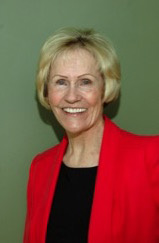Prologue: My sister, three brothers, and I attended rural public schools in southwest Missouri from the early 1940s through 1963. Our parents believed that a good education would link us kids to the opportunities in the world beyond our river valley farm, so they supported the local public schools with their time, talents, and treasure. Memories of the Great Depression and a hard boyhood stayed with Daddy. He often said, “Get your education. They can’t take that away from you.” Daddy was grounded in the realities of life. Mother was an idealist. Her expansive reading and writings opened windows on the possibilities of life for us kids and for Daddy. Her keen mind and imagination stretched all of us beyond the limiting absolutes of our time and place. Our parents’ unconventional pairing gave us children the expectation that good things would come if we got an education, kept our minds open, and worked hard. Our formal education began at Eureka Elementary, a one room country school.
Reunion: I poured coffee into Styrofoam cups as friends and old classmates gathered around a folding table in the community center of the Methodist Church. The aromas of strong coffee and something sweet baking in the kitchen infused the air in the large room. It was a warm August morning and former students, teachers, and old friends of Eureka Elementary School had gathered to share good food, drink, and memories. It was Reunion Day.
The tradition of Eureka’s annual reunion began when a few former teachers and students decided they would meet once a year at the school site to honor the symbol of unity the old school had once been for the community. Each time they met, the Methodist church nearby invited the group in for coffee. The group grew larger each year, and across time the meeting became an event neighbors anticipated and looked forward to. After several years, the original group passed the planning of the get-together to younger teachers and students. My generation finally got the job. Three of my friends and I had sent invitations, booked entertainment, and arranged for food service.
Kathryn, Leota, Doris, and I (the new planning committee) positioned ourselves at the end of the long table. We were ready to settle in and see how the day unfolded. We watched while familiar, and not so familiar, faces gathered in groups around the room.
“What do you remember of the place?” Kathryn asked. My friend set her coffee cup down on the table and gazed somewhere beyond me.
“You’ll have to let me think on that,” I answered. “What’s your recollection of school days here?” I returned the question.
“Not much,” she whispered, “not much except, it was hard. School work was just hard for me.”
“What are your first memories of school?” evokes various responses from people. Some recount moments of fear and self-doubt, others remember times of fun and play.
When my older brothers speak of their days at Eureka Elementary School, they usually laugh and start by saying, “To get to and from school every day, I had to walk three miles in the snow, uphill both ways.” That is fair warning that a tall yarn is bound to follow. When we remember and tell stories about school days long past, the tales we tell are sometimes truths, sometimes rose-colored fantasies, and almost always child-like exaggerations.
Kathryn brushed back a strand of graying hair from her eyes and continued her story while former classmates gathered around the table. As Kathryn talked, I sipped my coffee and allowed my thoughts to return to the gray stucco schoolhouse that had once stood a few yards from where we were sitting.
My imagination constructed a ghost of the one-room school. I mounted the tall step to the concrete porch, inhaled the smell of the oiled wood floor, and touched the teacher’s desk that dominated the front of the room. I walked between the student desks, which were bolted to the floor in rows. I recalled a minimal world, but one sufficient for the business of school. The accommodations of the place were inconvenient, but inconvenience was a common circumstance in rural Missouri schools during the 1950s. We girls walked fifty yards from the school’s front door to our three-seater toilet, while the boys dashed an additional twenty yards to their facility.
The hand pump, across the playground and ball field, promised a fresh drink of water. Weather permitting, we walked to the pump with our teacher to fill our cups once a day. In inclement weather, we relied on the water from the crock water cooler in the lunchroom. The inconvenience of the situation never registered in our cares. I smiled to myself recalling those days of the speedy long trips to the outhouse, the pleasant meandering path we took to the water pump, our collapsible metal drinking cups, and the Red Wing water cooler.
Kathryn’s words brought my attention back to the group.
“I struggled every day. I dreaded going to school,” she continued. Her pain was difficult to hear, as it contrasted sharply with the songs and funny stories we traditionally shared at our reunions. “I had vision problems. I couldn’t see the board. The words were fuzzy and ran together. Mom and Dad got glasses for me, and that helped some, but the teachers never made any special accommodations for my situation. Back in those days, they probably didn’t have the tools or training to help me. School work took so much effort. It was just hard.” Kathryn chose her critical words carefully. Her mother had been a teacher during those same years at a neighboring country school, Klondike Elementary. Kathryn knew, first hand, the obstacles teachers faced while serving in rural schools. She had seen her mother work hard to meet students’ needs while making do with inadequate materials and few resources.

Graphic by Serena Hocharoen
“Special attention was not part of the deal back then,” Doris said, as she turned to face Kathryn. “I remember Miss Duncan complimenting me for reading a flash card she had accidentally held upside down. I guess that was an accomplishment, but do you suppose that was the only commendable thing I ever did at school?” Doris’ expression turned sad and childlike. Her little-girl demeanor conflicted momentarily with her smart hairdo and fashion-forward style. “That is the first and last compliment I remember getting from a teacher,” she said, as she slowly shook her head recalling the moment.
The group at the table fell silent until Leota spoke up, commenting about reading with younger students while waiting for the teacher to interact with her class. I too remembered long periods of waiting for my teacher’s attention. The memories were unpleasant, because the waiting always ended with brief ineffectual lessons and disheartenment for me.
“Wanting to read was my first great school frustration,” I chimed in. “Mother was an avid reader, and I wanted to read like her. When I think of my first grade reading instruction, I still get nervous and a little angry.”
The group seemed interested, so I told them my recollections of how the school bell would ring, how we would sing and pledge our allegiance, and then how I would sit biding my time, waiting for reading class.
Eventually, Miss Neas would say, “Helen, bring your primer, please.” She was ready for me. She opened my primer. “Do you know any words on this page?” she asked.
“Oh, see. See Sally go.” I read.
“Very good, continue.”
“Oh, Sally. See Jane go ____. I don’t know that word.”
“Then say the words after me.” Miss Neas would read the rest of the story word-by-word. I repeated each word after her. She did not ask if I knew some of the other words. That was the end of the lesson. She was done with me. It was the “Look and Say,” reading instruction method. Students were to memorize the appearance of words, or learn to recognize words by looking at the first and last letter. That approach was probably not the best one for me. Word analysis and a few phonics rules would have served me better, but that approach to reading was out of style at the time. Miss Neas was fresh out of Southwest Missouri State College. She was following her professors’ “best practices” and had no experience with other instruction methods.
“The anxieties of not doing well and having no help to do things better; those are my first memories of school. Mother taught me to read before I completed first grade. I did learn to read, but I did not learn many reading skills at school,” I concluded.
My story was enough of the negative. Reunion Day was for remembering the good times. Our country school had been the heart of our rural community. Reunion was a time to celebrate and remember, with respect, the people who had taught and learned there.
We finished our coffee and joined a group gathering at the edge of the old schoolyard, near the Eureka Church Cemetery, where the original school bell hung stately and still.
Everett Bohanon, an octogenarian, rang the bell, calling our attention to the beginning of another country school reunion.
A Diller, a dollar, a ten o’clock scholar!
What makes you come so soon?
You used to come at ten o’clock,
But now you come at noon.
Everett completed his annual poem. Our small crowd moved from the bell back to the church community center and joined other old friends who had prepared food and arranged school memorabilia on tables around the room.
We pledged our allegiance to the flag and to one nation under God, stood quietly while the Gospel band played America the Beautiful, and then took our seats. Awards were bestowed for contrived accomplishments, such as living long and traveling great distances. We played trivia games, read poems, and told stories of days long gone.
Everett came to the microphone first to reminisce.
“This old hen used to come up from Maroney’s farm and would peck around in the school yard. So, one day I got me a kernel of corn, drilled a hole in it, and strung a string through it. I tossed that corn out onto the porch. Soon as that old hen saw it, she hopped up on the porch. Every time she got close to the corn, I’d give the string a yank. That hen came right on into the classroom. When the teacher saw that hen standing inside the door, I gave the string a big yank and stuffed it all in my pocket. I don’t think she ever knew what I’d done.”
Many in the crowd remembered, or related to, Everett’s story. They laughed and clapped their appreciation of the tale. A lot of pranks, mischievous behaviors, and some learning happened in those community schools. Everett spoke with warmth and good humor. He was recalling fond memories.
My brother, John, spoke next.
“I remember being so shy that I had to put my head under my desk to say my ABC’s; but, with the help of my teachers and support from some of the older girls, I was able to overcome my fears and eventually did very well in school,” he confessed to the crowd. He was being modest. John earned a doctorate degree in his twenties. He was a cute, smart, little whip with beautiful white-blonde hair. Supporting him was probably a pleasure for the older girls, waiting for their own instruction, and also a pleasant task for the young girl who was the teacher.
Cast back in time by others’ nostalgic stories, more schoolmates stepped forward and spoke of teachers and events that were amusing and evocative. One recalled a memorable teacher who used a paddle to inspire students. The elderly lady telling this story giggled like a school-girl and said that the teacher’s paddle had persuaded her that leisure might come later in life, but school work came first. Corporal punishment was a common disciplinary practice in most homes and was certainly seen as acceptable, and probably expected, as a disciplinary measure to be used by the rural school teacher-of-the-day.
Our rural school teachers were usually very young women and men with little teaching experience on their resumes. More seasoned teachers could get jobs in town schools where working conditions were more amenable and salaries were higher. Some of our teachers held teaching certificates from two-year Normal Schools, schools specifically for the training of teachers. Some teachers started their careers straight out of high school, after taking a college summer course of teacher training. Some were patient and compassionate. Some were not. All had little or no education and training in child development, curriculum and instruction, or classroom management.
Our teachers were tasked with unrealistic workloads of multi-age and multi-grade students, housekeeping chores, and some light maintenance of the school building. They did the best they could do with the conditions they met, and those conditions were part and parcel with our community’s social and economic standards.
By modern measures, the amenities of our one-room school were sparse and primitive, but they were similar to those in our family homes. Few houses in my community had indoor plumbing. Some, but not all, had electricity. The school site at Eureka was donated by a neighboring land owner. The school, like most homes in the community, was built by locals.
Parents repaired and maintained the structures and property. Their state and county taxes paid for the teachers’ salaries, text books, desks, and the stove. Room and board, for some young teachers, was provided by community families, in their homes.
Having such a direct and large investment in our education, most parents had high expectations that we would learn. Parents who were able to help their children with academics, did so. In many cases, parents were largely responsible for their children eventually learning to read, write, and do some arithmetic. While some of us country school students did learn, others of us did not do very well.
Our memories were often selective when we gathered for reunion, and some school history was just never mentioned on Reunion Day. We granted ourselves temporary permission to forget that most handicapped children did not attend public school, and that the students for whom one way of learning did not work well, simply dropped out. We also never spoke of the years in the 1950s and 60s when Eureka Elementary’s days were numbered, and small rural schools were fading into local history.
The consolidation of Missouri schools had caused conflicts and political divisions among our neighbors. Combining our small school with other area schools to create a larger, more efficient rural school, in the nearby town of Conway, Missouri, seemed logical to law makers. But that political proposal was viewed by many rural residents as a threat to the social and cultural fabric of their community. The adults who lived in isolated communities, like ours, clung desperately to their schools. They ferociously resisted Missouri’s rural school consolidation initiative. People had poured their time and treasure into their schools. They had no real proof that something different would be better. They wanted to retain control. The power and privilege of ownership was hard to relinquish. However, in the spring of 1958, Eureka’s projected enrollment was twelve students. Keeping the school open could no longer be justified. Eureka Elementary closed that spring, and we students were bused to Conway when school began in the fall.
The long war-of-words among neighbors and neighborhoods continued. The Conway, Missouri area’s resistance to rural school consolidation became the longest school consolidation battle in Missouri state history. The last school was annexed, and the Laclede County R1 School District was finalized in 1961.
Within a few years, Eureka’s empty one room school building had deteriorated and was demolished. Consolidation had removed the school from the heart of our community. There was a collective understanding that reunion should be an opportunity to recall and share the best of times. Everyone remembered the years of consolidation, but no one spoke of that time on Reunion Day.
One-room country schools had deficits, but they had assets that served their time and place. The habit of reunion reaffirmed each year that our school had been an important part of our past. The funny stories we told and the words we used created pictures in watercolor shades to soften the sharp edges of our school days; days that shaped our lives and built moral and intellectual character.
Reunion helped preserve the memory of the educational institution that provided minimal accommodations, but carried generations of Americans from a time when only the elite were educated to a time when all children could access the American Dream. The tales we told when we gathered for reunion were sometimes truths, sometimes rose-colored fantasies, and nearly always child-like exaggerations that gave veneration to a time past—a time well remembered.



